So you’ve taken the fight all the way to Ultima after liberating Bearers and smashing crystals to shiny smithereens (on your own terms, no less). Now you’re in search of a fitting follow-up experience. But with so many fantasy RPGs out there, it can be tough to know which may make a worthy successor to the saga of Clive Rosfield.
We’ve narrowed down a list of eight great games to choose from for your next epic undertaking. Yes, there are a couple of other Final Fantasy games here. But XVI is a somewhat uncharacteristic entry in the long-running series, and when it comes to seeking a follow-up, a lot depends on what aspects of it appealed to you most. We’ve gathered some entries that sync up well with FFXVI’s various strengths while also offering something new.
Final Fantasy VII Remake
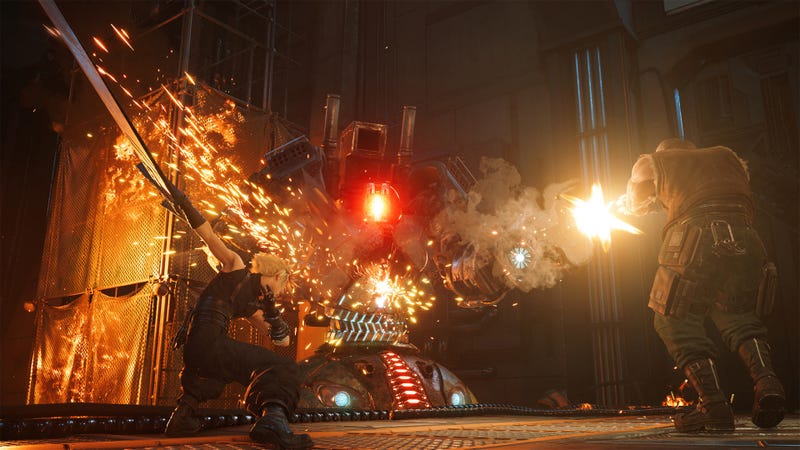
After years of anticipation and hype, the first entry in the ongoing project to remake legendary 1997 RPG Final Fantasy VII finally arrived in 2020. It remains one of the best Final Fantasy games in recent history, and its slightly more command-based combat system is sure to feel as “real-time” as Final Fantasy XVI’s combat, just with some more tactical considerations as well as full control over a party—something Final Fantasy XVI was notable for eschewing.
Final Fantasy VII doesn’t aim for the same kind of Game-of-Thrones-inspired moodiness and tone, but it certainly covers some heavy concepts. Environmental destruction is a central theme in the struggle the protagonists face, and its heroes are, in their own way, every bit as much the political radicals that Clive and his friends are.
If you’re really in the mood for another epic story, however, and aren’t opposed to playing an older game, I do recommend playing the original, 1997 Final Fantasy VII before jumping into Remake. That first game tells the entire original story (whereas Remake only covers the first act), and there are things that Remake is doing that you’ll only recognize and appreciate if you’re already familiar with the original game.
Buy Final Fantasy VII Remake: Amazon | Best Buy | GameStop
Mass Effect Trilogy
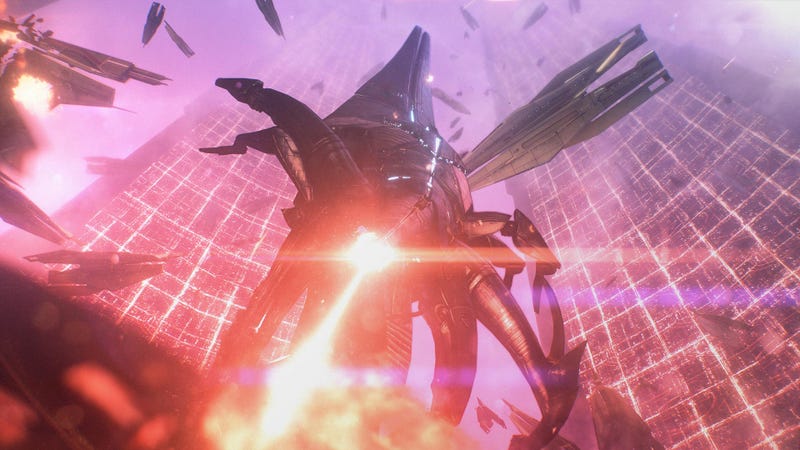
After romping around the pseudo-medieval realm of Valisthea, you might be in the mood for a complete change of genre. Good news: the first three Mass Effect games remain some of the best science fiction RPGs you can currently play. And the recent Legendary Edition re-release has made the trilogy easy to jump into on modern consoles and PCs.
Like Final Fantasy XVI, the stakes are high for Mass Effect’s characters, with potentially world-ending consequences should you and your comrades fail. You create your own Commander Shepard, choosing their gender, largely shaping their personality (you get some amazing opportunities to be a real space-jerk), and determining how they tackle combat, whether primarily through straight-ahead third-person shooting or with the help of magic-esque “Biotic” abilities.
And unlike a certain someone who just gave up when her ship wouldn’t fly, you’ll actually get a darn ship in Mass Effect with the Normandy. Mass Effect delivers on the fantasy of flying with your own crew who you’ll come to depend on to get you through thick and thin. Arguably, there’s far greater opportunity for real relationship-building here than there is in Final Fantasy XVI, since you get to actively participate in each conversation and influence how your connections with your crew evolve over time.
Buy Mass Effect: Legendary Edition: Amazon | Best Buy | GameStop | Target
The Witcher 3: Wild Hunt
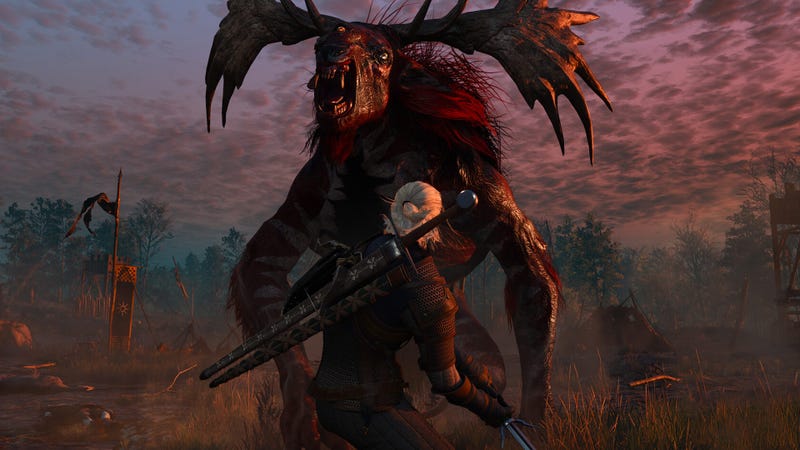
If you haven’t played The Witcher 3 yet, then this RPG work of art needs to be immediately next on your list. Don’t worry about the first two games if you haven’t played them (but if you’ve got the appetite for a trilogy that culminates in one of the best RPGs of the 21st century, by all means play the first two to get ready).
The Witcher 3 is set in a dark medieval fantasy world, much like Final Fantasy XVI. And while protagonist Geralt isn’t as directly invested in a quest for liberty as Clive, he does similarly find himself faced with many philosophical predicaments that evolve naturally out of the state of the world and the game’s various quests, which are often much more well-written and engaging than those in Final Fantasy XVI (and most other games, for that matter).
Combat in The Witcher 3 is also real time, but it’s a bit more grounded in RPG concepts like stats, status buffs and debuffs, than FFXVI’s is. There are more weapons and items to consider here, and specs are far more important. Also, if you enjoyed FFXVI’s monster hunts, then The Witcher 3 is here with an even better monster hunting experience. As Geralt’s day job is literally hunting monsters, you’ll pick up jobs, hunt out monsters, and often deal with the complicated narrative situations that unfold—you’re doing much more than just finding a monster and beating it to death.
The Witcher 3 is simply too good to sleep on. Go play it now (after bookmarking this page, of course, to come back for the others).
Buy Witcher 3: Wild Hunt: Amazon | Best Buy | GameStop | Target
Final Fantasy VIII
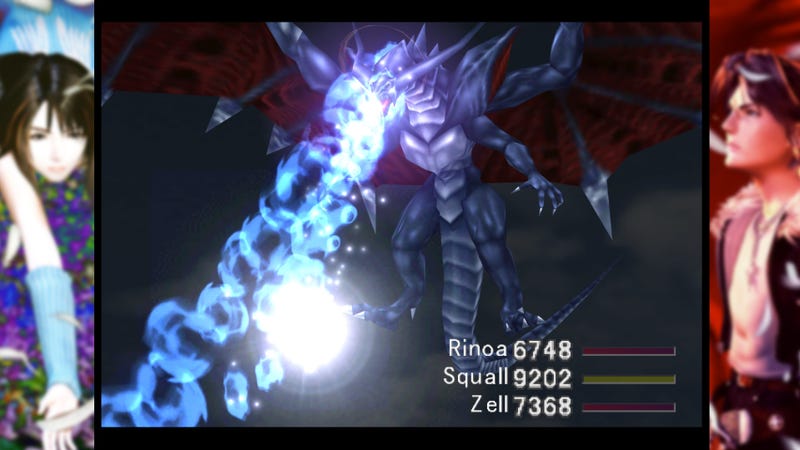
During my time with Final Fantasy XVI, I kept thinking about Final Fantasy VIII, not just because it’s probably my favorite Final Fantasy, but because there were some genuine synergies between these two FF games. Maybe a lot of that had to do with the fact that the main battle theme of FFXVI literally sounds like FFVIII’s fight music.
Or maybe it had to do with FFXVI’s cosmic plot focusing on the slow unraveling of a cosmic big bad whose motivations are somewhat mysterious and unclear. That wasn’t all. Everywhere I looked, I felt like I was seeing FFVIII. The central role that FFXVI’s summons (the Eikons) play in the narrative reminded me a lot of FVIII’s Guardian Forces, narratively and (to a certain degree) mechanically.
There’s a spellbinding fusion of fantasy and sci-fi in Final Fantasy VIII, and it’s executed in a way that feels incredibly natural, setting the stage for a mind-bending story that’ll stick with you.
I played Final Fantasy VIII back in 1998, and I still really don’t understand everything in its story. I don’t mean that it’s confusing in a negative sense,, but that it has a rich, almost dreamlike ambiguity, weaving the kind of mysterious, fantastical tale you can find all sorts of meanings in. I don’t think I’ll say the same about FFXVI 20-plus years from now. FFVIII keeps its cards very close to its chest in the narrative department and continues to bend and twist its story in interesting, unexpected ways over the course of its 4-disc adventure. As a classic FF, it features turn-based combat and strict RPG mechanics (which you can break the hell out of, by the way). If you’re not opposed to some ‘90s gaming vibes, FFVIII makes for an excellent follow up to FFXVI.
You may want to give some consideration to how you play this game, however. 2019’s remaster of the 1998 RPG features new character models and improved audio. But if I’m being honest, the lack of true analog movement and the jagged juxtaposition of the newer, fancier models with the old pre-rendered environments and lower-poly NPC models isn’t great. If you can, get yourself the PSX version and either a PSX, PS2, or PS3 to experience this 1990’s gem.
But if you’re only on PC and don’t have a legally obtained backup of the ISO and an emulator, go with the remastered version. The original PC release (which is still, somehow, on Steam) butchers the audio and soundtrack to an inexcusable degree.
Buy Final Fantasy VIII: Amazon | GameStop
Devil May Cry 5
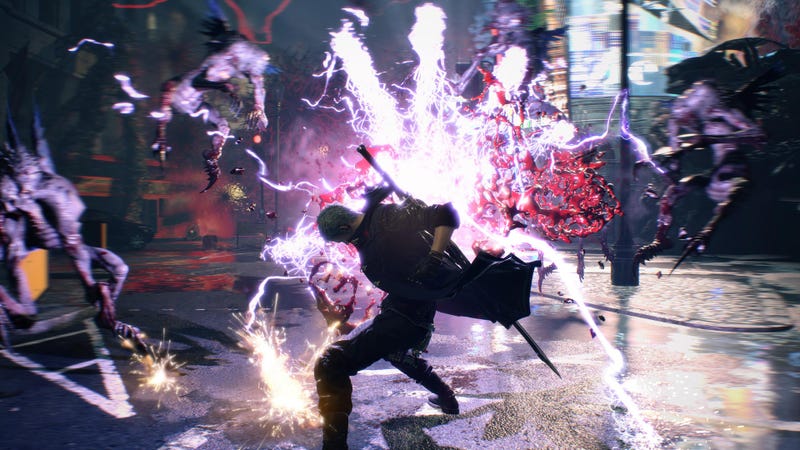
Okay, so you’ve had enough of the darn RPG stuff (even though FFXVI is very light on that front). FFXVI’s often exhilarating, can’t-put-it-down combat is the work of the game’s combat director, Ryota Suzuki. And while, yes, he did describe FFXVI’s combat as his “personal masterpiece,” I still think his work on Devil May Cry 5 is just a little bit better. It’s more blood-pumping and features a cast of three different characters with unique abilities that reward effort spent learning them—seriously, once I finally got the hang of DMC5’s V, that was a good time like little else out there.
Devil May Cry 5 doesn’t garner much praise for its story, and that’s largely a testament to how centered and good the combat is. But, honestly, if you’re familiar with the Devil May Cry universe, the narrative in DMC5 does some cool stuff. Watch a synopsis of the preceding games if you’re not familiar (or consider playing Devil May Cry 3 as a refresher—the first and fourth games are also decent, but avoid Devil May Cry 2 like the Crystal’s Curse).
Get yourself a good set of speakers, turn them all the way the hell up, and just zone out to a joyfully good time beating the absolute hell out of demons.
Buy Devil May Cry 5: Amazon | Best Buy | GameStop
Final Fantasy IX
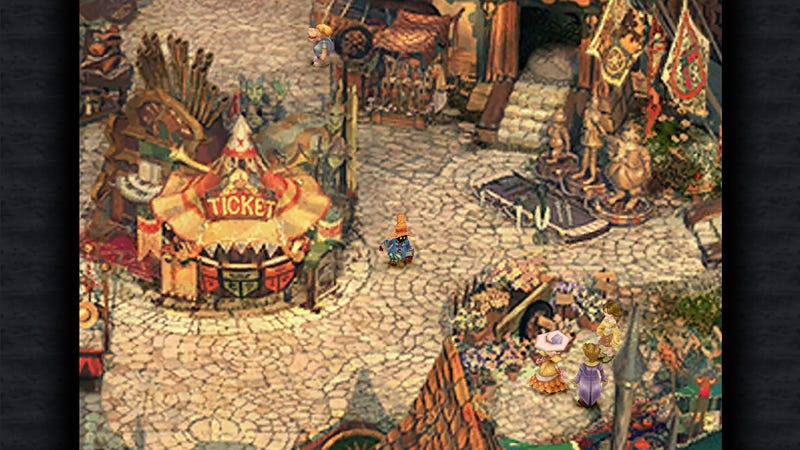
I came around to Final Fantasy IX years after it originally released on PSX in 1999, and damn, I didn’t know what a charming game I was missing. If Final Fantasy XVI’s medieval world drew you in, I implore you to consider playing IX. Though a 1990’s FF experience with turn-based combat, I find it contains all of the charm that made many of us Final Fantasy fans first fall in love with the series—and that Final Fantasy XVI was all too eager to shed in its quest for moody Game of Thrones mimicry.
Yes, Final Fantasy IX is set in a “medieval fantasy world,” but it’s one with a vibrant cast of characters, diverse species, and an endearing story where the protagonists must come to rely on each other to face insurmountable odds. It also doesn’t feel as derivative as Final Fantasy XVI’s world. While FFXVI’s setting does have some unique elements, I’ve seen this setting before in Game of Thrones, The Lord of the Rings, and just about any D&D book. A classic fantasy style for sure, but Final Fantasy IX just has enough of a different vibe in its architecture and world that it becomes a memorable place in a way I don’t think FFXI can lay claim to.
Buy Final Fantasy IX: GameStop
Xenoblade Chronicles 3
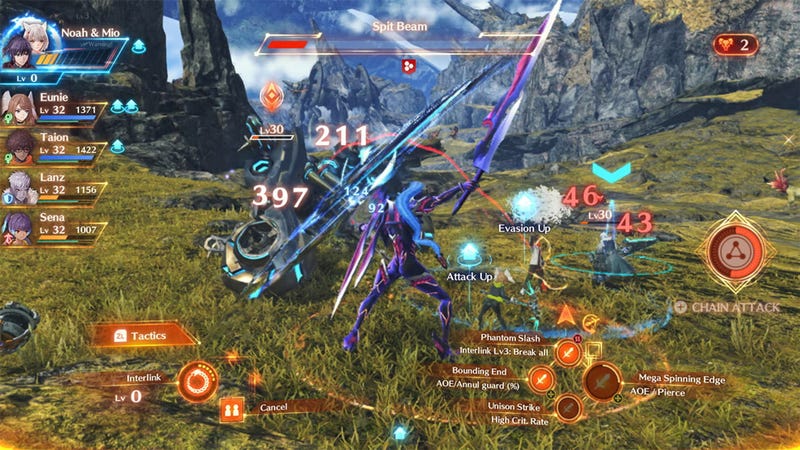
You can take this one on the go with you. As a Nintendo Switch exclusive, Xenoblade Chronicles 3 is a portable, epic JRPG fantasy world you can get blissfully lost in.
Like Final Fantasy XVI, Xenoblade Chronicles 3 features a real-time combat system with party members who act on their own, letting you focus on combat with just a singular character at a time. Xenoblade Chronicles 3’s combat has more in common with traditional RPGs, however, where you’ll need to keep track of different styles, specific class roles for characters, and more status conditions than FFXVI involves. That said, the combat does expect you to lean into enemies until you get them to a staggered condition, so the pace and rhythm of the combat will feel quite similar to FFXVI’s.
Xenoblade Chronicles also features a narrative that will feel very resonant with FFXVI’s world and themes, just with some more sci-fi flavorings. Colonies are at war with one another, there’s a cosmic big bad, and a quest for liberation of people who are oppressed and exploited by more powerful forces.
Buy Xenoblade Chronicles 3: Amazon | Best Buy | GameStop | Target
Horizon: Zero Dawn (and Forbidden West)
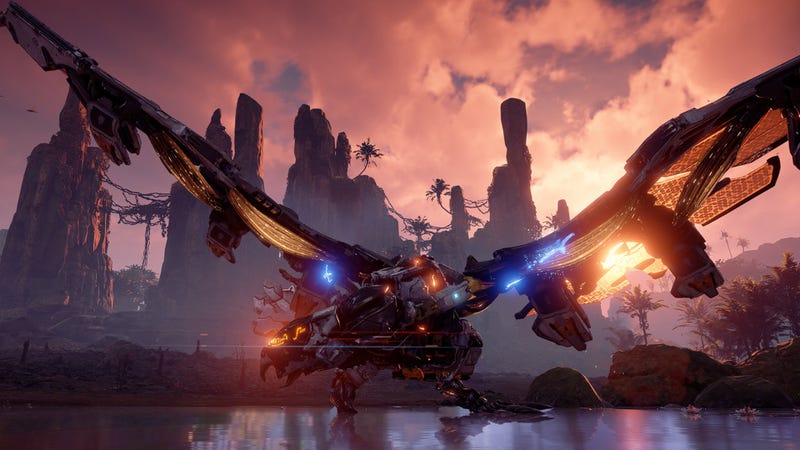
If you’re looking for another RPG to sink some time into, I heartily recommend the PlayStation-exclusive Horizon series (the first, Zero Dawn, is also available on PC). Horizon and FFXVI have their clear differences: Horizon features an open world and dino-robots, but that expanse of space and distinct enemy type might offer a satisfying change of pace from FFXVI’s more traditional medieval fantasy RPG experience.
Like FFXVI, there are mysteries at the heart of Horizon, which you’ll slowly uncover. It’s a science fiction story through and through, but given that it’s set far into the future after an apocalypse, the people of Horizon’s world live lives not too dissimilar from the denizens of Valisthea. And just as Clive begins to learn truths about the world hidden from most normal folk, so too will Horizon’s protagonist Aloy come to carry the burden of understanding why the world is the way that it is, and the true nature of the crisis it faces.
Horizon’s melee combat is simpler than what’s in FFXVI, but it makes up for that with bows that feel great and a dynamic action-based fighting style that encourages you to shoot off specific parts of your robo-dino foes, making use of specific elemental weaknesses when appropriate, and relying on traps to get tactical in your struggle against the metal beasties.
Horizon is also a visual treat in a way that Final Fantasy XVI rarely is, making use of its open world to give you a nice variety of gorgeous locales that’ll make you feel justified in an expensive console and TV combo purchase.
Buy Horizon: Zero Dawn: Amazon | GameStop
Buy Horizon: Forbidden West: Amazon | Best Buy | GameStop | Target
That wraps our assortment of great games to pick up after Final Fantasy XVI. Which ones have you played? Are there any standouts or other games you’d recommend?
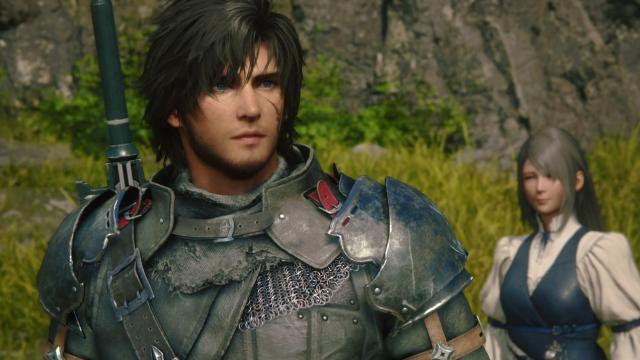
Leave a Reply